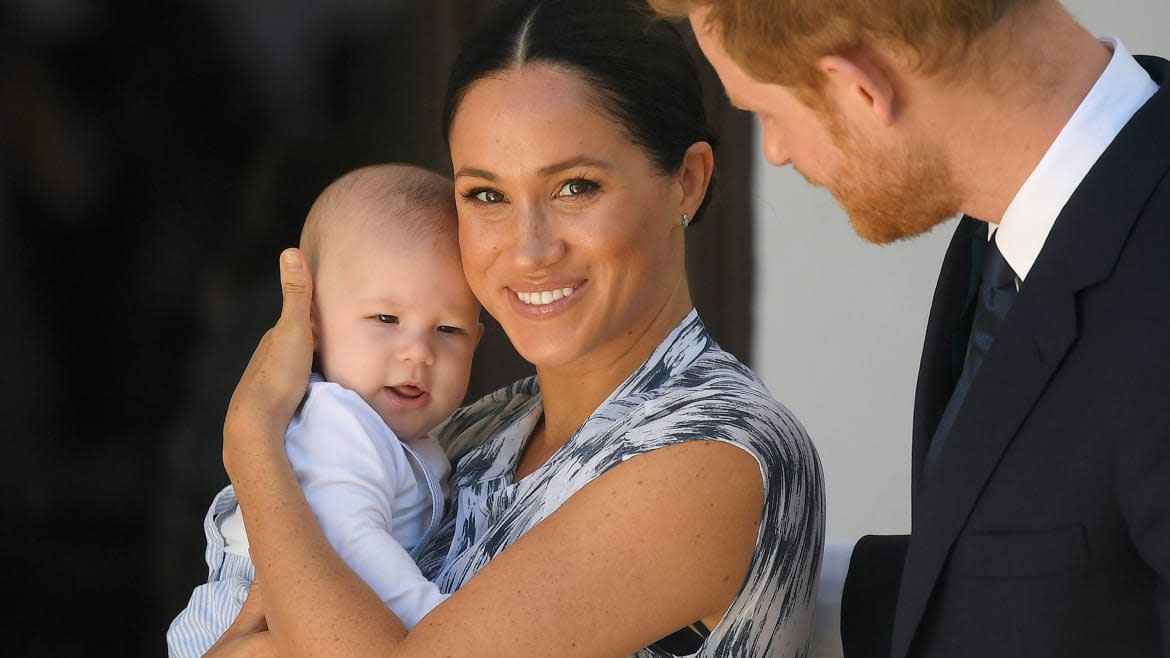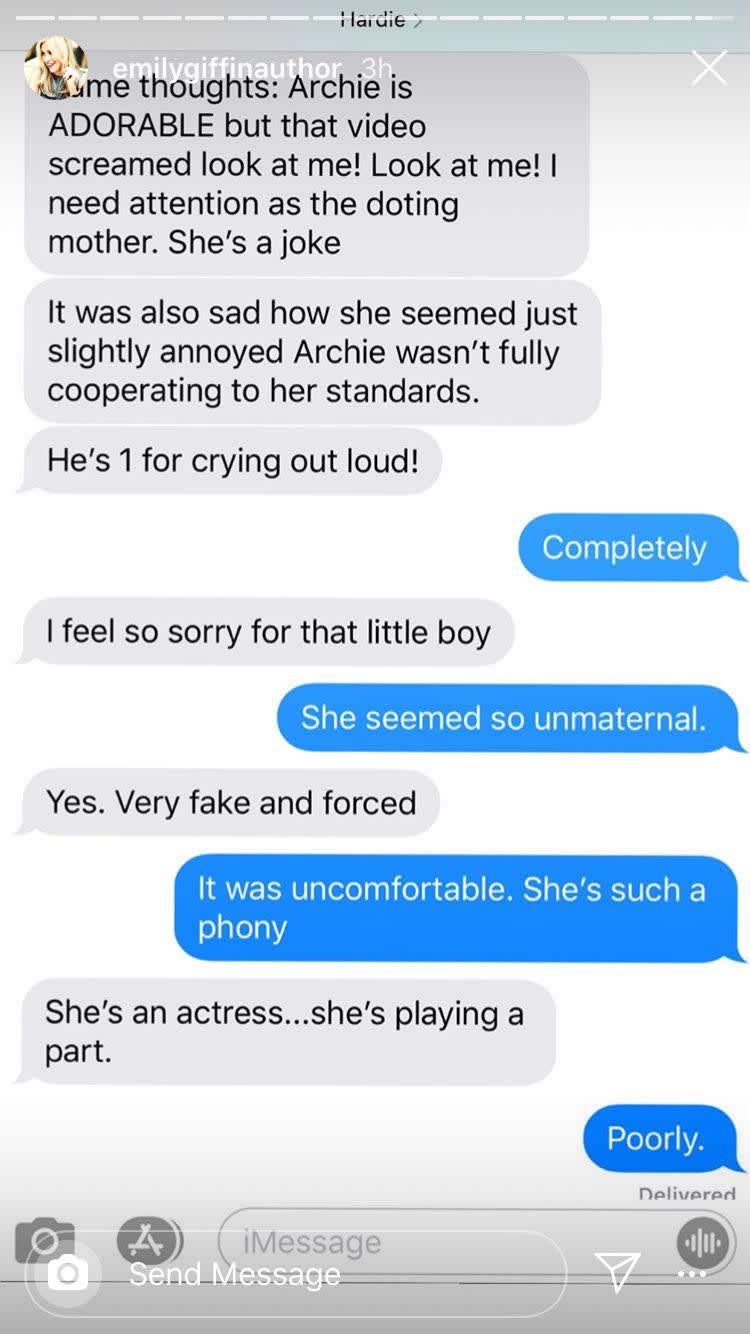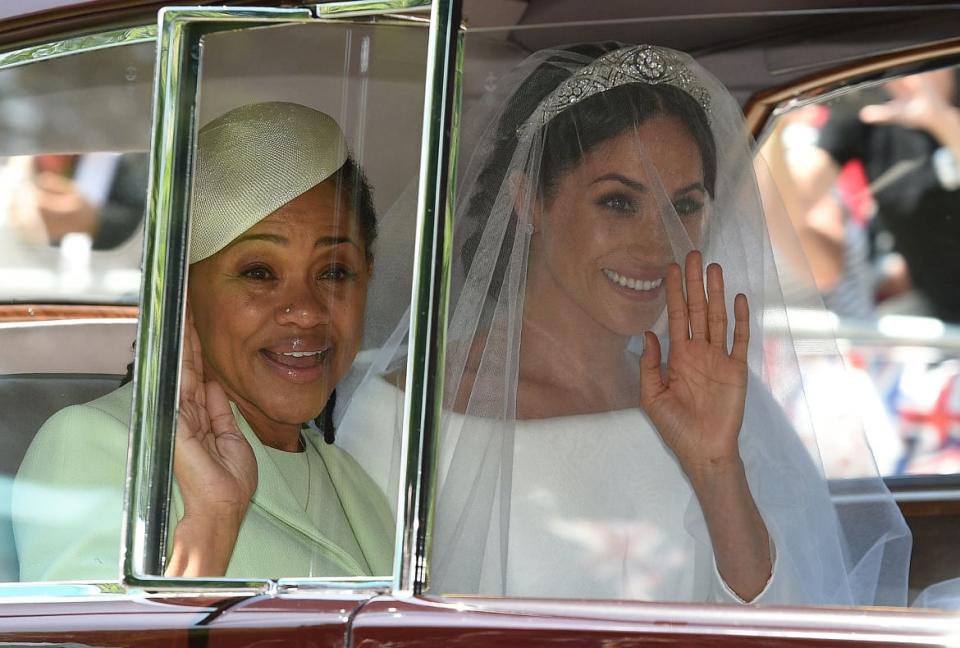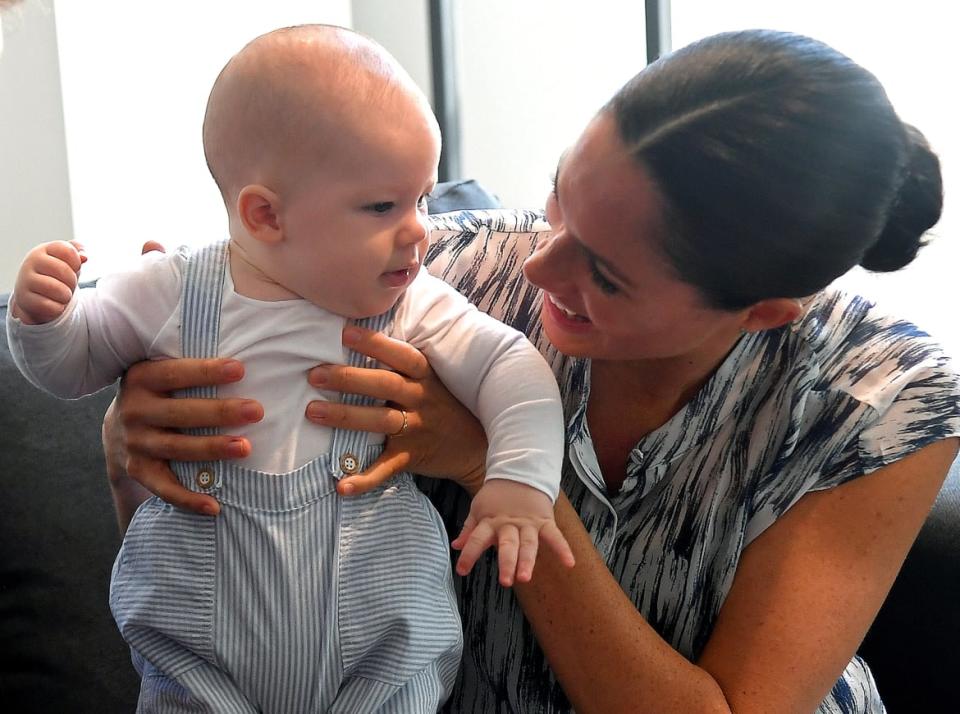The Ruthless (and Racist) Mom-Shaming of Meghan Markle

Meghan Markle is a duck. Or perhaps she’s a rabbit. It all depends on your point of view.
Indeed few figures in modern popular culture have been as polarizing as the erstwhile working royal, who abruptly upped sticks with her husband, Prince Harry, from the United Kingdom to North America in a dramatic whirlwind of abandoned titles, dismantled relationships, and venomous tabloid headlines that decried the decampment as “rogue,” “petulant,” and an “atrocious lapse of judgement.” Still others praised her for her courage in breaking not only away from the royal family but also a post-Brexit Britain brimming with nativist nationalism and an “an ever thickening loom of imperial nostalgia.” Meghan’s such a good mother for shielding her and Harry’s 1-year-old son, Archie, from that “toxic” atmosphere. No, she’s a bad mother for failing to support Archie’s little neck and body. And would somebody please put a sun hat on that baby! Duck! Rabbit!
Did the Duchess of Sussex have duality in mind when she chose to read Duck! Rabbit!, a children’s book by Amy Krouse Rosenthal and Tom Lichtenheld, to Archie in a video for the charity Save the Children earlier this month? Archie squirmed, fussed, lunged off screen, and took a chomp out of the book like babies are wont to do. Shot through the chorus of “good job, Mama” and “look how big he is,” however, was a vein of vitriol.
“This video is all about Meghan. Poor Archie, only used [as] a prop,” one person said on Twitter. “She didn’t give birth to him we all know that,” said another, alluding to a conspiracy theory that the Sussexes faked the pregnancy. “Meghan’s demeanor in the video screamed look at me! Look at me! I need attention as the doting mother,” clucked a third.
Then Emily Giffin, bestselling author of romance novels like Something Borrowed, decided to wade in. In a now-deleted (but forever screenshotted) story posted on Instagram, the self-declared “royal watcher” blasted Meghan for being “phoney” and “unmaternal.” She also insinuated Meghan was a bad mother for filming Archie wearing a diaper but no pants. “I feel so sorry for that little boy,” she concluded. “Happy birthday, Archie. Go away, Megan [sic].” (Giffin, who did not respond to a request for comment, later apologized for being “mean spirited.”)


Mom-shaming has been around as long as there have been mothers, but the widespread adoption of social media, where everyone wields a 10-foot megaphone, has only pumped up its volume and reach. Celebrities are not only not immune to the phenomenon but they’re often exposed targets. Beyoncé, Chrissy Teigen, Pink, and all three Kardashian sisters have been mom-shamed for a litany of perceived maternal sins, from letting their children wear makeup to wearing too much makeup.
“What Emily Giffin was saying is probably not unlike conversations we may have had about celebrities in private with our friends on Friday night with a drink, ‘Oh, I can’t stand that actor,’ ‘He seems like such a phony to me,’ ‘I don’t believe him when he went on the talk show and said this,’” said Elaine Lui, founder and editor of Lainey Gossip. “Emily Giffin’s problem is that there are some things that are appropriate in private conversation with people who know you. When you blast it out there, you have to be able to defend it, especially as a public person yourself. And Emily Giffin is a public person.”
Kate Middleton, wife of Harry’s brother, William, and queen-consort-in-waiting, hasn’t attracted the same level of bile because she’s “essentially followed the royal baby playbook,” from the post-delivery appearances on the steps of the the Lindo Wing to the classically English outfits on George, Charlotte, and Louis. (Kate was dinged for letting a then-toddler George wave around a toy gun, but the moment quickly passed.)
“So if you mom-shame Kate, you’re not just mom-shaming her, you’re mom shaming an institution; you’re coming for the entire family and you’re saying that the way that the royal family has raised all of the royal babies is wrong,” Lui said. “And so it almost makes her untouchable.”
The Bizarre Cult of Meghan Markle Pregnancy Truthers
Lockdown or Not, It’s Summer, and Celebrities Are Stripping For Selfies
Plebeian moms field their own share of shaming, too. Nearly two-thirds of mothers said they felt they had been criticized for their parenting decisions, according to a 2017 poll by the C.S. Mott Children’s Hospital in Michigan. Mom-shaming can be psychologically damaging to the mother being shamed, said Sarah Clark, research scientist at the department of pediatrics at Michigan Medicine and co-director of the poll. More than 40 percent of the mothers she surveyed reported feeling more unsure about their parenting.
“To undercut somebody’s confidence, I think can be really, really detrimental,” Clark said. “You know that we have high rates of postpartum depression, I’m sure, but there’s also a lot of anxiety among young parents. One of the things I worry about is mothers—particularly mothers of young kids—who become very anxious or depressed and feel they’re not good enough.”
Certainly there are few absolutes in parenting. Children change on a day-to-day basis, if not hour-by-hour, and new parents might think they have their baby figured out only to have the script completely rewritten the next moment. “[Parenting] is prone to challenging one’s confidence,” Clark said. “And then you add this other layer of people saying you’re doing it wrong, which can be really devastating for a mom who doesn’t have a strong sense of self and some support from friends or family.”
As for dad-shaming, well, dads get lauded as heroes for just casting a glance at their offspring. What people don’t realize, says Bethany Johnson, a history instructor at the University of North Carolina at Charlotte and co-author of You’re Doing it Wrong! Mothering, Media, and Medical Expertise, is that when they lash out at mothers, they’re really engaging in a “long-term historical project.” And that goes double if they’re American.
“From the beginning of American history, motherhood has been a political project in terms of what kind of citizen you were raising,” she said. “One of the ways you could prove your Americanness was to do a certain kind of mothering. And the kind of mothering you’re supposed to do is to raise a good, pliant citizen who would make themselves available to the country in times of need.”
The “Republican” mother of the 18th century, for instance, was portrayed as an “angel of the household” who upheld the morality of her children. Victorian-era motherhood required mothers to create a home-based haven that was divorced from the violent contingencies of the marketplace and public square. In the 1950s, mothers were expected to raise consumers who would demonstrate a supremacy of democracy over communism by keeping the post-World War II economy alive.
“There’s always been a role that women had to play,” Johnson said “What people don’t understand, when they’re critiquing other mothers, is they’re doing that political project for the political body. It’s like internalized propaganda.”
Part of the reason why moms might criticize each other is because they are on the receiving end a lot of the time. “I see that is coming from a real place of pain,” she said. “And we don’t see that we’re perpetuating these larger social mechanisms that allow all of us to stay in our place. Because if we’re picking at each other, it’s harder for us to combine together and get rid of systems that don’t work for us, like the total lack of maternal and paternal leave.”
Wednesday Martin, a cultural critic, social researcher, and author of Primates of Park Avenue, says that mom-shaming is rarely about the criticism being offered. “Whenever there is mom-shaming going on, almost all the time, it is a sign that a woman is not just threatening people’s concept of who and what a good mother is, but that somebody is threatening additional deeply-held cultural beliefs,” she said.
Take the repeated attacks on the way Meghan holds Archie in public (correctly, according to at least one parenting expert). “[It indicates] a kind of rage for deeper perceived transgressions,” Martin said. “And those are that Meghan Markle is a biracial actress from the United States, and that she represents an American form of aristocracy, competing with a British form of aristocracy and literally attempting to blend with it in her marriage to Prince Harry and creating a collision.”
Some mothers mom-shame, Martin believes, because ancient humans evolved as cooperative breeders, meaning social groups took care of their shared offspring as a collective. Your children were my children and vice versa, and raising them was a team effort. “The argument can easily be made that the practice of cooperative breeding—which is the reason many anthropologists believe that our species thrived, while other hominid species died out—is still alive with us in the back brain in a lot of our social beliefs and parenting practices,” Martin said. “But we can’t express our support for mothers in the form of cooperative child-rearing and communal living anymore. So it often gets expressed as criticism.”
With Meghan, there are other factors at work. People in the United Kingdom are heavily invested in the idea of aristocracy, even the lower and middle classes who don’t benefit from it, because it gives them a sense of cohesiveness and contributes to their national identity. “In Great Britain, when you’re born, you’re born into a certain class and that’s the way it stays, and the aristocracy is the pinnacle of that,” Martin said. Meghan, on the other hand, represents an “American version of aristocracy,” which is based on social mobility rather than the lottery of birth.
“She’s beautiful, she has a successful career in Hollywood, she has a significant measure of celebrity on social media,” Martin said. “And she comes over and suddenly what you see is two different systems of cultural capital colliding. She is an upstart to end all upstarts and she is so profoundly threatening to this system of social stratification that it ends in a complete firestorm.”
Americans internalize class warfare, too, she added. Enter Emily Giffin, an American. “I think that Emily Giffin is voicing, even unconsciously, that Meghan Markle is disruptive to a social system,” she said. “So one of the ways to really get at her for being disruptive to social categories—for being biracial, for being an American aristocrat among British aristocrats—is to question her motherhood and her authenticity as a mother.”

Meghan Markle and her mother, Doria Ragland, arrive for her wedding ceremony to marry Britain's Prince Harry at St George's Chapel, Windsor Castle, in Windsor, on May 19, 2018.
Neither can we talk about the anti-Meghan discourse without bringing up race. The world is frequently unjust and often outright hostile to black mothers. In the United States, black women are three to four times more likely than white women to die of pregnancy-related causes; in New York City, they’re eight times more likely to die. Black women are more susceptible to preexisting health conditions such as obesity and hypertension, but public health researchers also say that structural racism hampers access to the types of resources—quality medical and social services, say, or nutritious foods—that are critical to good health and pregnancy outcomes.
“Black mothers are dying at alarming rates from pregnancy-related causes in part because of racial bias in our healthcare system,” Senator Kamala Harris, who raised the disparity on the 2020 presidential campaign trail, wrote on Twitter last May. “Everyone should be outraged this is happening in America.”
Even wealth and status don’t insulate black women from the wrong side of the life-death divide. In 2018, tennis champ and Markle pal Serena Williams told Vogue how she struggled to convince doctors to check for signs of a pulmonary embolism—a condition to which she was prone—after she found herself struggling for breath in the aftermath of an emergency C-section. Williams asked for a CT scan and a blood thinner, but a nurse suggested that the pain medication might have left her confused. When Williams insisted, a doctor performed an ultrasound on her legs. Nothing showed up. Finally, they ordered a CT scan, which revealed several blood clots in her lungs. Williams was vindicated. “I was like, listen to Dr. Williams!” she said.
When they survive, black mothers are often attacked and undermined, said Mikki Kendall, author of Hood Feminism: Notes from the Women That a Movement Forgot. “Black mothers are somehow both supposed to be perfect nannies, right? Like everybody wants a black nanny as a status symbol in certain circles,” Kendall said. “But people also project the idea that black mothers are somehow less capable of raising their own children. And the reality is there’s nothing black mothers of any socioeconomic status can do to change that.”
For Kendall, the fixation certain people have with Meghan says a lot more about them that it does her because many of the criticisms aren’t rooted in any reality. The agita over the Duck! Rabbit! video struck her as especially bonkers. “We didn’t see Meghan Markle do anything mean, she didn’t lose her temper with her baby, she didn’t snap at her baby,” she said. Archie doesn’t look like he’s being abused, ignored, or neglected. He looks like every pudgy, happy baby in the history of pudgy, happy babies.”
A black mother of two, Kendall rarely posts about her children on social media for a reason. A few years ago, a white woman accused Kendall of emasculating her teenage son because she told her Twitter followers that she had advised him to be honest with the girls he was dating. Another said she was stymieing his development. Once, when she drove up to her son’s school to deliver a pair of gym shoes he had forgot for the umpteenth time, along with a matter-of-fact warning that she wouldn’t be doing so again, a white mother who happened to be there chided Kendall for being “too harsh” and “damaging.”
“There’s always someone with a comment, there’s always someone with a criticism,” Kendall sighed. “But when you’re parenting with a marginalized identity, some of the criticism really has nothing to do with what’s happening in front of the person talking to you. So it’s not that if Meghan Markle behaved differently people would respond better.”

Meghan Markle and her baby Archie
Dani McClain, a journalist and author of We Live for the We: The Political Power of Black Motherhood, thinks that some of the discomfort around Meghan stems from long-held beliefs that black women are “too strong, castrating, and not knowing our place.” Meghan is often portrayed in the tabloids as bossy and demanding, and much of the blame for the Sussexes’ transatlantic escape has been laid squarely on her shoulders. Some dog-whistles have been shriller than others: A Northern Irish TV presenter called Meghan “uppity.” So did a producer for Sean Hannity’s radio show.
Certain people might be bothered by the outsized role Meghan’s mother, Doria Ragland, plays in their lives in the same way former first lady Michelle Obama’s mother, Marian Robinson, ruffled feathers when she moved into the White House. Rumors abound that Harry and Meghan want Ragland to move in with them.
“I think Meghan’s mother, who’s like phenotypically black, really triggers people,” McClain said. “I think this idea of having a black mom around, shaping the culture of the family, and having a kind of strong position within the family, is really challenging to people who believe very strongly in male-headed households and women’s power being subordinate to men’s power.”
Ultimately, people will find fault in Meghan, whether as a wife, a mother, or a person in her own standing, just because she exists, McClain said. “Even before she had the baby, there were some people who were really invested in white womanhood and invested in the idea of Harry choosing someone more like Kate Middleton,” she said. “I think those folks are really triggered by Meghan and I think they will continue to be triggered by her no matter what she does.”
Get our top stories in your inbox every day. Sign up now!
Daily Beast Membership: Beast Inside goes deeper on the stories that matter to you. Learn more.

